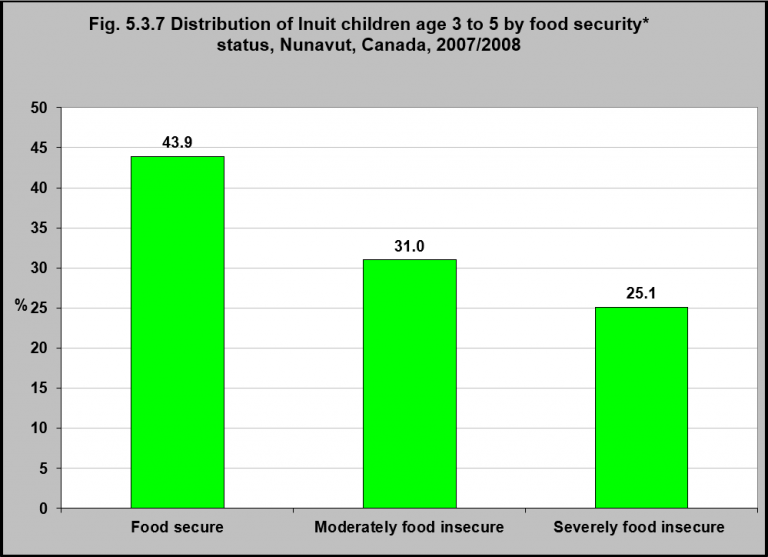Distribution of Inuit children age 3 to 5 by food security status, Nunavut, Canada, 2007/2008

Note:
*Food security is a condition in which all people, at all times, have physical and economic access to sufficient, safe and nutritious food to meet their dietary needs and food preferences for an active and healthy life.
Source: CICH graphic created using data adapted from Egeland GM, Pacey A, Cao Z and Sobol I. Food insecurity among Inuit preschoolers: Nunavut Inuit Child Health Survey, 2007–2008. CMAJ February 23, 2010 vol. 182 no. 3. http://www.cmaj.ca/content/182/3/243.full -accessed July 17, 2017.
In 2007/2008, 31.0% of Inuit children aged three to five years living in Nunavut communities were moderately food insecure and 25.1% were severely food insecure.
That means that in total, 56.1% – or more than half of the children – were food insecure.
Implications
Rates of food insecurity are highest among Inuit in Inuit Nunangat, at rates almost double that of the national average.1 While, parents and caregivers will often sacrifice meals for themselves to provide for their children, rates of food insecurity are nevertheless very high for Inuit children. Food insecurity has physiological and nutritional consequences experienced from the early stages of life right through the life course, including anemia, obesity, slower growth rates, and learning and behavioral impacts that will extend into Inuit children’s lives and affect future education.2 The consequences of this will be experienced not only by the individual, but by the entire community.
1Rotem, T. (2016). Beyond hunger: Malnutrition and Inuit children. Feeding Nunavut. http://www.feedingnunavut.com/beyond-hunger-malnutrition-and-inuit-children/ -accessed August 23, 2017.
2See for example, Pirkle, C.M., Lucas, M., Dallaire, R., Ayotte, P., Jacobson, J.L., Jacobson, S.W., Dewailly, E., & Muckle, G. (2014). Food insecurity and nutritional biomarkers in relation to stature in Inuit children from Nunavik. Canadian Journal of Public Health, 105(4), e233-8; Rotem, 2016; and Expert Panel on the State of Knowledge of Food Security in Northern Canada. (2014). Aboriginal food security in northern Canada: An assessment of the state of knowledge. Ottawa, ON: The Council of Canadian Academies. http://www.scienceadvice.ca/uploads/eng/assessments%20and%20publications%20and%20news%20releases/food%20security/foodsecurity_fullreporten.pdf -accessed September 12, 2017.
